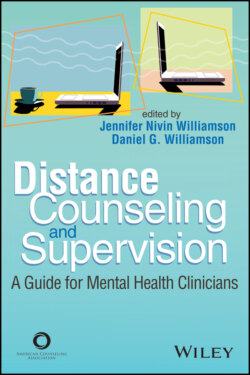Читать книгу Distance Counseling and Supervision - Группа авторов - Страница 24
Social Media
ОглавлениеSocial media is a ubiquitous part of modern life, and it becomes complicated when combined with HIPAA and Health Information Technology for Economic and Clinical Health Act regulations and counselor ethics. Counselors often use social media in their personal lives, to promote their practices, or to network with other mental health professionals in their area. It is imperative that they be mindful of the risks and maintain appropriate boundaries and confidentiality. It is a counselor’s ethical responsibility to understand the risks involved in using social media and take appropriate precautions. Counselors should construct and share with clients a clear policy regarding the use, limitations, and risks of social media with current and former clients. This policy should be included in the informed consent (ACA, 2014; AMFTRB, 2016; NBCC, 2016a, 2016b).
The first step in setting appropriate boundaries is to maintain separation between personal and professional social media use. It is recommended that separate accounts be created if a counselor plans to use social media for professional purposes. Just as one would maintain separate personal and professional lives, one’s virtual life should include similar boundaries (ACA, 2014; AMFTRB, 2016). Counselors should become aware of the security settings available on their various social media platforms and use them to protect the public accessibility of information. These boundaries should be clearly articulated in their social media policy included in the informed consent.
Discretion should be exercised when using and sharing social media. Counselors should never share confidential information in private or public chats and forums. They should refrain from diagnosing anyone even if they are historical or public figures. Counselors should avoid posting anything they would not say in real life (ACA Government Affairs, n.d.). Although venting about difficulties or frustration is common on social media platforms, it is recommended that counselors refrain from posting anything that would be deemed derogatory or unprofessional. Although separate accounts are recommended, there are times when personal social media accounts might be reviewed for jobs or for professional service (i.e., by state licensure boards, state committees, etc.).
Although it is common practice in social circles to research new people on social media, the ACA Code of Ethics (ACA, 2014) forbids counselors from exploring clients’ social media without written consent. This has been likened to peeping into a client’s living room windows without having been invited.
The risks of using social media should also be assessed. Counselors who use social media applications should remain aware of how the permissions settings in the platform function when creating social media accounts. Access to confidential client information might be allowed unintentionally. Most user agreements give access to other elements of the user’s device, including contacts, photos, and other content. Client information might be vulnerable to snooping and unintentionally breached. Doffman (2019) cautioned that appropriate protection from social media applications comes down to the users themselves.
